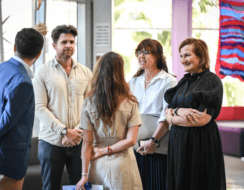11 Jul 2017
NewsSSI talks Ignite, refugee resettlement in Canada ideas exchange
Canadian government agency, Immigration, Refugees and Citizenship Canada, invited Ms Roumeliotis to present at the National Settlement Council meeting in Vancouver in July on the theme ‘outcomes and innovation’.
Ms Roumeliotis discussed SSI’s unique Ignite Small Business Start-ups program – a small business incubator for fledgling refugee entrepreneurs, before sharing perspectives on the Australian approach to settlement and integration.
Following the forum, SSI representatives, along with Paul Power, the CEO of the Refugee Council of Australia, participated in over 20 meetings and site visits in Vancouver, Toronto and Ottawa, with a focus on reviewing private sponsorship and settlement support for refugees.
Private sponsorship of refugees (PSR) has been part of the Canadian resettlement landscape since the Indochinese refugee crisis in the late 1970s and is estimated to have resettled about 200,000 refugees since that time. Groups involved in private sponsorship raise the equivalent of one year of social security income which is held in a trust account and paid to the sponsored refugees to meet settlement and other expenses when they arrive in Canada. These groups are responsible for assisting refugees in the first 12 months after arrival with orientation and other activities, including helping them find affordable housing, employment and education.
When considering the cohort of refugees who have arrived in Canada impacted by the Syrian Conflict, there is some evidence that privately sponsored refugees achieve higher employment in the short term when compared to refugees who enter Canada under the government-assisted program.
These initial strong settlement outcomes are thought to be in part due to a social capital transfer with most privately sponsored refugees getting significant in-kind support from the private sponsor and their own connections they may have in Canada such as other family members.
Government-assisted refugees on the other hand are very vulnerable refugees when compared with privately sponsored refugees. This was an area that the SSI team was keen to explore along with the idea that moving quickly into employment by taking ‘any’ job on arrival may impact refugees in the long term as they did not take sufficient time to retrain and reskill for the Canadian labour market.
Australia has the Community Support Program, where up to 1,000 places each year have been allocated within the existing Refugee and Humanitarian Program for business and community sponsors to bring refugees to Australia. Learnings from the Canadian visit will inform SSI’s view on the strengths and weaknesses of the Australian Community Support Program and how best the organisation can be involved in finding durable solutions for refugees. Look out for a joint SSI and RCOA policy paper that will draw together the lessons learned.
By SSI Executive Officer Katrina Grech


